研究生科技英语阅读课文翻译8
- 格式:doc
- 大小:26.50 KB
- 文档页数:4
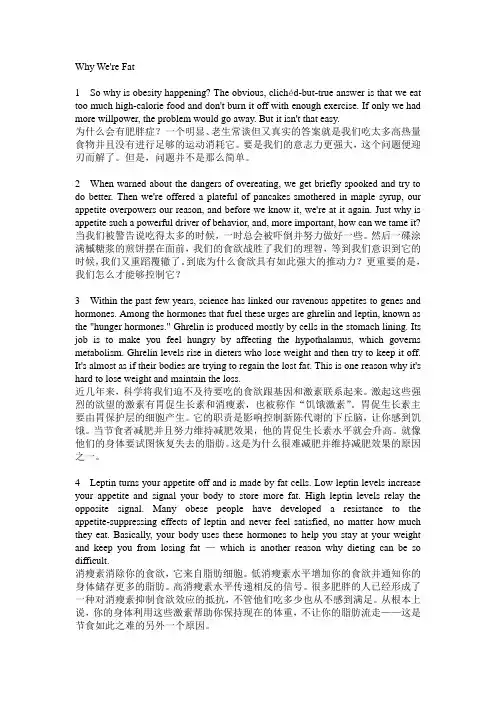
Why We're Fat1 So why is obesity happening? The obvious, clichéd-but-true answer is that we eat too much high-calorie food and don't burn it off with enough exercise. If only we had more willpower, the problem would go away. But it isn't that easy.为什么会有肥胖症?一个明显、老生常谈但又真实的答案就是我们吃太多高热量食物并且没有进行足够的运动消耗它。
要是我们的意志力更强大,这个问题便迎刃而解了。
但是,问题并不是那么简单。
2 When warned about the dangers of overeating, we get briefly spooked and try to do better. Then we're offered a plateful of pancakes smothered in maple syrup, our appetite overpowers our reason, and before we know it, we're at it again. Just why is appetite such a powerful driver of behavior, and, more important, how can we tame it? 当我们被警告说吃得太多的时候,一时总会被吓倒并努力做好一些。
然后一碟涂满槭糖浆的煎饼摆在面前,我们的食欲战胜了我们的理智,等到我们意识到它的时候,我们又重蹈覆辙了。
到底为什么食欲具有如此强大的推动力?更重要的是,我们怎么才能够控制它?3 Within the past few years, science has linked our ravenous appetites to genes and hormones. Among the hormones that fuel these urges are ghrelin and leptin, known as the "hunger hormones." Ghrelin is produced mostly by cells in the stomach lining. Its job is to make you feel hungry by affecting the hypothalamus, which governs metabolism. Ghrelin levels rise in dieters who lose weight and then try to keep it off. It's almost as if their bodies are trying to regain the lost fat. This is one reason why it's hard to lose weight and maintain the loss.近几年来,科学将我们迫不及待要吃的食欲跟基因和激素联系起来。
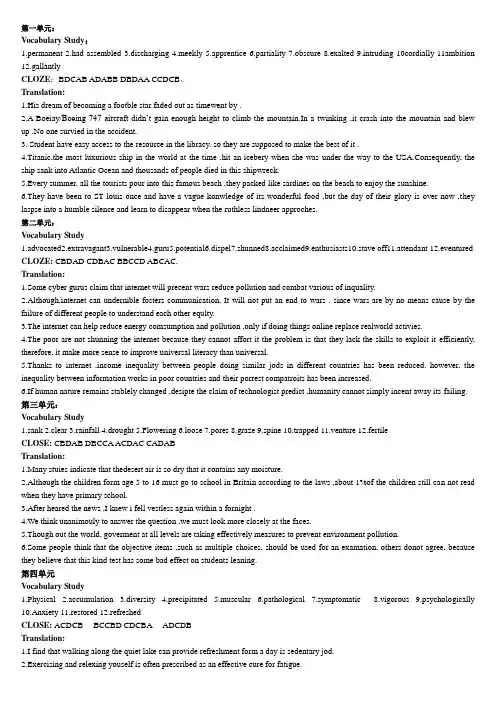
第一单元:Vocabulary Study:1.permanent2.had assembled3.discharging4.meekly5.apprentice6.partiality7.obscure8.exalted9.intruding 10cordially 11ambition 12.gallantlyCLOZE:BDCAB ADABB DBDAA CCDCB、Translation:1.His dream of becoming a footble star faded out as timewent by .2.A Boeiay/Boeing 747 aircraft didn’t gain enough height to climb the mountain.In a twinking ,it crash into the mountain and blew up .No one survied in the accident.3. Student have easy access to the resource in the libracy. so they are supposed to make the best of it .4.Titanic,the most luxurious ship in the world at the time .hit an icebery when she was under the way to the USA.Consequently, the ship sank into Atlantic Ocean and thousands of people died in this shipwreck.5.Every summer, all the tourists pour into this famous beach ,they packed like sardines on the beach to enjoy the sunshine.6.They have been to ST louis once and have a vague konwledge of its wonderful food ,but the day of their glory is over now ,they laspse into a humble silence and learn to disappear when the ruthless lindneer approches.第二单元:Vocabulary Study1.advocated2.extravagant3.vulnerable4.guru5.potential6.dispel7.shunned8.acclaimed9.enthusiasts10.stave off11.attendant 12.eventured CLOZE: CBDAD CDBAC BBCCD ABCAC.Translation:1.Some cyber gurus claim that internet will precent wars reduce pollution and combat various of inquality.2.Although,internet can undernible fosters communication, It will not put an end to wars . since wars are by no means cause by the failure of different people to understand each other equlty.3.The internet can help reduce energy comsumption and pollution ,only if doing things online replace realworld activies.4.The poor are not shunning the internet because they cannot affort it the problem is that they lack the skills to exploit it efficiently, therefore, it make more sense to improve universal literacy than universal.5.Thanks to internet ,income inequality between people doing similar jods in different countries has been reduced. however, the inequality between information works in poor countries and their porrest compatroits has been increased.6.If human nature remains stablely changed ,desipte the claim of technologist predict ,humanity cannot simply incent away its failing.第三单元:Vocabulary Study1.sank2.clear3.rainfall4.drought5.Flowering6.loose7.pores8.graze9.spine 10.trapped 11.venture 12.fertileCLOSE: CBDAB DBCCA ACDAC CADABTranslation:1.Many stuies indicate that thedesert air is so dry that it contains any moisture.2.Although the children form age 5 to 16 must go to school in Britain according to the laws ,about 1%of the children still can not read when they have primary school.3.After heared the news ,I knew i fell vestless again within a fornight .4.We think unanimouly to answer the question ,we must look more closely at the faces.5.Though out the world, goverment at all levels are taking effectively measures to prevent environment pollution.6.Some people think that the objective items ,such as multiple choices, should be used for an examation, others donot agree, because they believe that this kind test has some bad effect on students leaning.第四单元Vocabulary Study1.Physical2.accumulation3.diversity4.precipitated5.muscular6.pathological7.symptomatic8.vigorous9.psychologically 10.Anxiety 11.restored 12.refreshedCLOSE: ACDCB BCCBD CDCBA ADCDBTranslation:1.I find that walking along the quiet lake can provide refreshment form a day is sedentary jod.2.Exercising and relexing youself is often prescribed as an effective cure for fatigue.3.The less active you are ,the faster aging process accelerates and the more vulnerable you became to physical and psychological problems.4.We are collecting money for repairs to the chur .if any of you would like to make a contribution ,we shall be most grateful.5.The scientist are currently focus on making experiment,in hope of finding effective methods to cure cancers.5.The speach that the chairman delivered at the conferences made much sense to regain the confidence of empolyees.第五单元Vocabulary Study1.uniform2.distinguish/recognize3.ascertained4.recognized5.unique6.outlet7.tactile8.rigid9.secure 10.acquisition 11.fruitful 12.foundationCLOSE :ADBBA DDCBA CCADB DCABATranslation:1.Tt is generally accepted that the upbring of the childild with the home is closely related to the education of the child in school.2.Jennifer is the chief of personal for the NewYork Heracal Tribune ,where she is also responsible editcrical work in the fied of public relations .3. It was two years ago that Jeff met Rose at his sister"s birthaday party ,they had been communited with each other by email since then the more Jeff know Rose ,the more he like her.4. The measure is effective not only in providing job opportunity for the laid-off works ,but also in limiting price increases.5Similarly , they inefficiency treated the political and economical back ground of the cinspiracy.6Tremendacs capital has met the needs of rapid economic growth on one hand and has caused the in flation on the other hand.第六单元Vocabulary Study1.As a matter of fact2.are plagued3.versus4.have ben reflecting on5.positive 6is implementing 7.will enroll 8.has been enriched 9.aspiration 10.academic 11.well-informed mitment toCLOSE:: BBACB BCAAD CBABD BBCCBTranslation:1.Passing the English examination should enhance your chances of getting the post.2.The discovery of god in the valley will enrish the mountain area.3. Only when police confronted her with evidence ,did she admited that she had stolen the money.4. The meting will afford you an opportunity of hearing good public speakers.5. An offical statement laid to rest the remain fears aout possible redundancies in the industry.6.MARY IS pretty bright ,ASa matter of ,her teacher told me that she is certain to get a university place this year.第七单元:Vocabulary Study1.downsized2.dynamic3.yield4.had guaranteed5.inflict6.budget7.priority8.accelerating9.shirk 10.vitally 11.jiopardize 12.criteria CLOSE:CDBCA BCBBA DDABA BCCDCTranslation:1.Black people in this area complained to the goverment that they had been subjected to repeated racial attacks from the local police officers.2.The goverment officers are inclined to apply the science and technology to short -term projects ,which is benifical to scientific development.3.The precious manager did not want to invest time and money in training the employees who could leave the company any times,an a result of which ,there was a scrious talent drain.4.We are collecting money for repairs to the church ,if any of you would like to make a contribution ,we shall be most grateful .5.The scientist are currently focus on making expeiments,in hope of finding efctive methods to cure cancers.6.The speach that the chairman delivered at the conferences made much sense to regain the confidence of empolyees.第八单元Vocabulary Study1.acid2.shaded3.knock-on4.Drain5.banks6.spacing7.band8.needles9.filter 10.altitudes 11.variables anismCLOSE: CACDA BAACD DBDCB ACDABTranslation:1.Mexico city is one of the most popucated cities in the world.2.The finding shows that a substantial difference between the opinions of men and woman.3. I can’t r emember whether i left my credit card home or in the car .4.We cannot assume the suspects to be gulity simly because they are deliveed to remain silent.5.The main question that faces Chinese economists at present is how to use the price levers and the competition system to direct resources into areas which yield better returns.6.It is assumed in the next 20 years the most surprisiing development will take pace in the space flight ,but now space craft a being developed and they can be used many times instand of only one.第九单元:Vocabulary Study1applied 2repentance 3penetrated 4monkey-like 5contrast 6impressed 7passionate 8awakened 9succeeded 10blossoms 11expectant 12opportunityCLOSE: CDBAA DABCC DBCBC DABBATranslation:1.On those days and nights when I was waiting for the results of the Entrance Examination,my heart was filled with wonder(or uncertainty).Iwondered what the fouture held for me,of surprise and excitement or disappointment and sorrow.2.The little girl ran swiftly to catch up with her mother and stretched out her hand to her mother,crying for more candies and drinks.But the mother persisted that they had bought encough.3.His wife was sent into the operation room.He walked to and fro outside,smoking one cigarette after another.When he saw the door opened,he felt a thrill of tenseness.4.Under the gaze of his colleagues,he flushed with embarrassment and bowwed hi head.He casually took up a newspaper and hid hi face behind it,petending to be reading it.5.They fixed all their attention on the research project on hand.They believed that as long as they didn’t lose heart,they woule succeed in thesse experiments in time.6.She had just given birth to an infant when her husband left/deserted her.In despair,she shut herself and the infant in aroom,claiming that they would perish together.Thanks to the policemen who came in time,the mother and the daughter escaped death by a hair’s breath(or had a narrow escape).第十单元:Vocabulary Study:1.in his own right2.make good use of3.ready for4.went forth5.are looking forward to6.figure out7.assembled8.were dissolving9.withstand 10.controversy 11.an obstacle 12.resembleCLOSE:CABBD ADADA DDCCC BCADATranslation:1.we must figure out how to solve the tissue-rejecuion problem.2.his behavior under fire approved him a man of courage.3.In addition to the impressiveness of the settings,there is aue of the camera that at times seems magical.4.At first,no ready technical data were available,but we managed to go without.5.She has some difficulty in giving shape to her ideas.But she resembles her mother in the way she moves her hands when she talks.6.The most part of their designs corresponds to actual needs and regulations on environmental demand,the other part needs reconsidering.一个小男孩的梦想马克吐温1我小的时候,我们那密西西比河西岸的村镇上,玩伴们都只有一个水恒的志愿。

英⽂写作翻译频道为⼤家整理的研究⽣科技英语阅读翻译,供⼤家参考:)Group: Number 1 Members: Yu Zhehua Yang Jing Rong Wei Wangxiaoqiao Li Ni Liu Qian2011-12-231.What is it that makes mathematics mathematics?Mathematics n. 数学,数学运算,数学应⽤译:是什么使数学成为数学?是什么使数学成为数学?成为数学2.What are the precise characteristics that make mathematics into a discipline that is so central to every advanced civilization, especially our own?Precise adj. 精确的,准确的译:到底是数学的哪些特性使得数学成为对每⼀种⾼等⽂明,数学成为对每⼀种⾼等⽂明,尤其是对我们现在的⽂明如此重要的学科?3.Many explanations have been attempted.对此,译:(对此,)我们已经试着做出了⼀些解释。
解释。
4.One of these sees mathematics as the ultimate in rational expression; in fact, the expression “the light of reason” could be used to refer to mathematics.Ultimate In fact Refer to n.终极,顶点事实上,实际上把…归因(于),认为…起源(于)译:有⼀种解释认为数学是⼀种终极的理性表达⽅式;⽽实际上,极的理性表达⽅式;⽽实际上,我们可以⽤“ 理性之光”们可以⽤ “ 理性之光 ” 这个说法来形容数学。

Whupping (whipping/Beating) Fat AlbertBy Rudolph Giuliani[1] My father was an excellent (perfect, wonderful) boxer. His poor eyesight prevented him from becoming the prizefighter (warrior/ knight) he wanted to be, but at 6 feet and a lean 150 pounds, he was fast and tough. He understood the sport and would describe fights to me in great detail, explaining the strategies and techniques of the great fighters, men like (such as) Sugar Ray Robinson, Joe Louis, Willie Pep, Rocky Marciano, and Jersey Joe Walcott.[2] In boxing, he said, the most important skill was to stay (be) calm. This was the best lesson my father ever taught me—stay calm, especially when those (people) around you are uneasy or troubled (upset). The one who stays unruffled has a great advantage in being able to help others, to control the situation, to fix it. The fighter who loses his cool (calmness) the first time he's hit will end up flat on his back on the canvas. If he remains calm, even while he's being hit, he can look for opportunities to hit back. (knock down->out knock out)[3] The lesson came in handy (turned out/ proved to be useful). My Uncle Willie was a New Y ork City police officer. Long after he retired, he always wore a jacket and, usually, a tie. He was a shy (silent/ timid) man who kept to himself (silent), and he'd spend his off hours reading the paper under the tree in front of our house. Next door lived another family, and the father was also a cop. For some reason, my uncle disliked him—perhaps he'd been nasty or unfair to Uncle Willie. Anyway, this guy (man/ fellow) had a son named Albert, a big fat kid, two years older than me—I was about 5 and he was 7. Albert took advantage of his size to intimidate (frighten) the other kids. He'd knock them down and roll (sit) on them.[4] My uncle used to read Spring 3100, the in-house police magazine. I loved looking at it—still do, in fact. I would pore over (study sth. carefully) Uncle Willie's copy, but only for so long—my uncle would always take the magazine back. One day he was sitting alone under the tree and my mother was nowhere in sight. He called me over. A copy of Spring 3100 was by his side.[5] "Y ou want this magazine, right?"[6] "Y es," I replied.[7] "Y ou want it to keep?"[8] "Sure!'[9] "Beat up Albert, and I'll give you the magazine."[10] "What do you mean?"[11] Uncle Willie said, "Look, your father's been teaching you to box. Throw a couple of jabs like your old man showed you and Albert will start crying—he's a fat slob and bullies are never as tough (strong/ powerful) as they seem."[12] I was reluctant, because Albert was much heavier than I was. But Uncle Willie showed me the magazine and let me hold it, before taking it back and repeating that it would be mine as soon asI got (made) Albert to cry uncle.[13] A little while (moment) later, Uncle Willie was sitting in his usual chair, when (suddenly) I saw Albert up to his usual tricks, pushing some kids around, all of them smaller than he. I don't remember exactly how it (fighting) started. All I know is that I found myself in a fight with him, just the two of us.[14] I started jabbing at his face—boom, boom, boom, exactly as I'd been taught—and they (jabs) were landing, nearly all of them. Albert never laid a hand on me—or if he did, I didn't notice.His nose started bleeding, a shiner was rising (swelling) nicely (noticeably), and finally he started to cry. Then he turned and ran home (ad.).[15] I went home, too, and told my mother. She slapped me hard (heavily) across the face. "Apologize right now, and I'm going to tell your father tonight. He's going to give you a real beating."[16] "I don't want to apologize," I mumbled. "He started it." For that I got a second slap.[17] Albert was still crying, and I begrudgingly (reluctantly) said, "I'm sorry, Albert." My mother made (forced) us (to) shake hands and ordered me to stay in for the rest of the day. I glanced at my uncle, and thought, at least he could give me the darn magazine. But I didn't give him up. I just went slowly up to my room. About 20 minutes later, his daughter, my cousin (/=nephew/ niece) Evangeline, came up. She was carrying his copy of Spring 3100. "My dad wanted you to have this," she said. "Since you have to stay in all day." I looked out the window. Uncle Willie was still there, under his tree, and he gave me a nod—as much for keeping my mouth shut, I knew, as for whipping Albert.[18] My father came home that evening, and my mother told him what had happened. I could hear them (talk) talking in the room next door. It was his fault, my mother said, for teaching me to box. He should give me a licking (beating) I'd never forget. My father came up to me, but before he could adopt (~ed child) a suitable face (expression) of disapproval, he blurted, "You whipped Albert? God almighty (mighty=powerful)! He's two years older than you, and 25 pounds heavier!" (mighty=powerful)[19] Standing up to bullies might sound like a glib call to be macho (brave), but the truth is it takes a toll on you. One of the best reasons to let bullies know you won't back down (withdraw/ retreat) from a fight is so (difficult) that it doesn't get to (express) that point (meaning). That's not just a theory—there were many times (cases/ often) in my administration when an early confrontation led to far less fighting (struggle) down the road (in the direction). Here's an example. At about 8:40 p. m. on Wednesday, July 17, 1996, TWA Flight 800 crashed into the Atlantic Ocean just off (away from) Long Island. All 230 on board the Paris-bound 747, which had taken off from Kennedy International Airport, were killed. My community response team and I got to the scene (site)(scenery) within an hour and set up an assistance (help) center at the Ramada Plaza Hotel near the airport to provide aid (help) and counseling (comfort) to family members. [boarding school][20] When we got (arrived) there, the first thing we tried to do was (to) obtain (get) the manifest so (that) we could be sure who had been on the plane. Airlines are required by law to compile a complete list of passengers on international flights, including full names, passport information, and emergency phone contact numbers. This information is supposed (thought to (=should) be made available within three hours of any crash. In this case, by 11:30 p. m., TWA said 229 people were aboard. By noon the next day, they were saying the number was 228. Later in the afternoon, they put the number at 230. I repeatedly demanded an accurate passenger list from TWA but was given every excuse why the airline couldn't produce one. I sensed (felt) something was up (was happening) when I received a call about 4 a. m. from the CEO of the airline, Jeffrey Erickson, from a plane heading for Kennedy. I told him that I needed the manifest. He said we would talk when he got to New Y ork, that he wanted to "liaise" (contact) with me. I don't agree to liaise with people I haven't met. But then I thought, well, maybe I shouldn't be so judgmental (subjunctive) based on the use of one word.[21] By the next day, I was exasperated. I felt we were getting the runaround. When Ericksonfinally showed up (appeared), he addressed the families and the press at Kennedy Airport, and spoke for under (less than) a minute. He refused to take a single question. He added nothing to what we already knew; there was certainly nothing to liaise about.[22] On behalf of the families of the passengers—and with an eye toward future disasters—I decided to make my anger known. On several national shows and on all the local channels, I criticized TWA for caring more about covering (hiding) itself than promptly notifying (informing) suffering family members. On Friday, I recorded my weekly WABC radio show from the Ramada and said, "The upper management of TWA incompetently handled (delt with) the notification process for the families. That continues to be exacerbated (worse) by their not telling the truth about what happened."[23] Three months later, Erickson resigned (sign + nature->signature). But that wasn't the point (key). In a city the size of New Y ork, disasters are inevitable (=unavoidable). I wanted leaders of companies involved in any future disaster to understand just what was expected of them—clear, honest, timely communication. By refusing to keep quiet about TWA's behavior, I made sure (granter) the consequences of putting corporate needs ahead of human suffering were understood. (1, 388 words).OUT THE AUTHORRudolph William Louis "Rudy" Giuliani III (born May 28, 1944) served as the Mayor of New Y ork from January 1, 1994 through December 31, 2001.EXERCISESI . Reading ComprehensionAnswer the following questions or complete the following statements.1. Rudolph Giuliani's father was _____.A. a successful boxing prizefighterB. able to win fights with techniquesC. very tall and strongD. well informed of boxing2. The strategies and techniques of a great fighter that Rudolph Giuliani learned from his father _____.A. were soon practicedB. were later used when he grew upC. didn't work for GiulianiD. were made into theory by Giuliani3. Uncle Willie didn't like their neighboring policeman probably because _____.A. he often abused childrenB. he was unfair while executing the lawC. he had treated Uncle Willie unfairlyD. he was a crazy and unreasonable man4. What made Giuliani decide to beat Albert?A. Albert took advantage of his size to bully other kids.B. Albert used to intimidate Giuliani.C. Giuliani didn't like him.D. Giuliani wanted to keep a police magazine.5. In the fighting between Giuliani and Albert, Albert _____.A. lost his control the first time he was hitB. missed almost all his targetsC. ended up flat on his backD. never had any chance to use his hands6. After Giuliani's father was told about the fighting he _____.A. was very excitedB. gave Giuliani a real beatingC. didn't believe itD. kissed his son as an encouragement7. The theory of standing up to bullies _____.A. took a heavy toll in Giuliani's later lifeB. became a very useful strategy in Giuliani's lifeC. led to far less fighting in Giuliani's later lifeD. helped him win in his running for the mayor8. Giuliani criticized TWA company for _____.A. being unable to provide an accurate passenger listB. planning to liaise with GiulianiC. its covering of itselfD. its CEO's be lated showing up9. The most important reason for Erickson's resignation is that _____.A. he lied to the public about the truth of his companyB. as a CEO he didn't live up to the expectations of the publicC. his company was involved in a disaster in which too many people were killedD. as a CEO he was incompetent in dealing with their business partners10. Giuliani disclosed the TWA's misconduct because he wanted to tell the companies that _____.A. they must pay price if they care about their company' interests more than human injuries and lossB. they will lose in the competition with their rivals if they put their needs ahead of human sufferingC. serious consequences will follow if they don't corporate with the city's government in a disasterD. companies will suffer a lot if they don't communicate with the public honestly and timelyII. VocabularyRead the following sentences and decide which of the four choices below each sentence is closest in meaning to the underlined word.1. Traditionally it is a peaceful event, without confrontation between police and what they describe as the hippy convoy.A. connectionB. exchangeC. fightD. interaction2. Tom Landry is one of the most successful football coaches in National Football League history, and he was known for his unruffled manner and fierce competitiveness.A. calmB. braveC. politeD. mild (climate<->weather)3. At the auction, he offered ridiculously low bids and intimidated other would-be buyers so that he could buy back the farm at an extremely low price.A. betrayedB. frightenedC. gatheredD. cheated (deceive)4. After the boss announced that he would move the company to Los Angeles, all the employees begrudgingly accepted the plan as they were afraid of losing the job.A. presently (timely/ in time/ promptly)B. reasonablyC. willinglyD. reluctantly5. People with ADHD have difficulty keeping their minds on one thing; they may run into thestreet without looking, blurt out inappropriate comments in class, and interrupt conversations.A. utter (->utterance)B. conductC. makeD. crush6. An attendant Labor press officer mumbled: "We're shameless, aren't we?" [(1)vt.: attend a meeting/ a class; (2)vi.: attend to sb.; flight attendant]A. claimedB. acknowledgedC. proposed (suggest)D. muttered7. During the congressional elections of 1866, Johnson campaigned for his Reconstruction Program (project), but his efforts hurt his cause (事业) more than they helped. This exasperated him into heated (激烈) and undignified arguments. (congress->Capitol)A. hitB. beatC. angeredD. stirred8. One primary intervention therefore was for me to liaise regularly with the ward so that Mrs. Allen was fully informed about the situation. (well-informed<->ill-informed; inform sb of sth.)A. negotiateB. contactC. imposeD. stimulate (stimuli and response)9. Difficult market conditions were exacerbated when Korean tanners entered the UK and New Zealand raw material markets, driving up prices.A. deterioratedB. (alter<->)changedC. (go to sb’s relief/ relieve sb./ rescue sb./ relief->relievedD. solved (a problem; answer a question)10. Thus all material to be shown will have been compiled in the knowledge that it would be made available.A. verifiedB. sortedC. extractedD. (A is ~ of B and C. ) composedB. Choose the best word or expression from the list given for each blank each word or expression only once and make proper changes where necessary.take a toll on end up pore over slap bullylose one's cool be up come in handy strategy promptly1. Human-made structures also take a toll (bring heavy losses) on migrants. Skyscrapers and radio towers have caused the deaths of hundreds of thousands of migrating birds. (migrate->migrant; emigrate<->immigrate)2. Amanda stayed calm at the moment and didn't lose her cool (n.).3. We both like driving it so much that we end up using it all the time.4. We should remember from Mayhew's account (description) that the boots also come in handy (prove to/ turn out to be useful) for kicking policemen and other traditional foes (夙敌) of the costers.5. In his lunch breaks Doisneau pored over books on photography, and at weekends he set off (start out) alone with a heavy wooden camera and tripod to capture the first of the "personal" photographs that would be the basis (base) of his life's work.6. Last night the woman, who did not wish to be named, said: "I'm really (fury->)furious, I'd just love to slap him on (the) his nasty face."7. I could tell by the look (expression) on his face that something was up (was happening).8. Essential (important) information on the progress of the project is conveyed throughout its duration and any enforced changes are notified promptly (timely/ in time).9. This use of a series of releasers, one after the other, is a strategy frequently employed (used) in communication.10. He wasn't, in fact, a very nice (good) boy, a bully and rather stupid.III. ClozeThere are ten blanks in the following passage. Read the passage candidly and choose the hest answer from the four choices given .for each blank.New Y ork City has a highly centralized municipal (urban<->rural) government. The mayor, chosen by a citywide electorate for a four-year term, has wide 1 powers. The mayor has a leadership role in budget-making, authority to organize and reorganize administrative agencies and to 2 and remove their heads, a strong veto (否决权), and all powers not specifically otherwise granted. The comptroller (审计官) , elected on a citywide basis for a four-year term, recommends financial policies and advises the mayor and the city council in the preparation of the 3 .There are nine major administrative agencies, called administrations. The police and fire departments are not 4 as administrations, but are also principal (major) agencies. Certain important city agencies include the board of education, the board of higher education, the health and hospitals corporation, and the housing authority. 5 two major agencies are bi-state or regional in character (nature): the Port Authority of New Y ork and New Jersey, which controls airports and interstate buses, and the Transportation Authority, which controls subway and bus operations in the city and railroad service in New Y ork and Connecticut.Legislative authority is 6 by the city council, made up of 51 members, who are elected from 7 districts for four-year terms. The 8 officer is the public advocate, chosen for a four-year term by a citywide electorate. The advocate can vote only to 9 . The most powerful member of the council is the speaker (spokesman), who is chosen by a 10 of the members and appoints the heads of the various council committees. The council introduces and legislates all laws and approves the budget; it can override a mayoral veto by a vote of two-thirds of all the members.1. A. productive B. manipulative C. speculative D. executive2. A. appoint B. fire C. arrange D. offer3. A. economy B. budget C. revenue D. expense4. A. included B. undertaken C. classified D. called5. A. At last B. As usual C. In addition (=besides) D. After all6. A. grabbed B. guarded C graded D. granted7. A. personal B. individual C. private D. single8. A. presidential B. practicing C. presiding D. present9. A. break a tie B. make a decision C. draw a conclusion D. give a summary10. A. minimum B. maximum C. minority D. majorityIV. TranslationPut the following parts into Chinese.1. The one who stays unruffled has a great advantage in being able to help others, to control the situation, to fix it. The fighter who loses his cool the first time he's hit will end up flat on his back on the canvas.能够保持冷静的人占据很大优势。

科技英语阅读翻译Unit 2 Physics1. Directions: Work on your own and fill in the blanks with the main idea.Part 1 (Paras. 1-3): Brief introduction to dark energy Para. 1: Dark energy is an unexplained force which tugs galaxies away from each other.Para. 2: Dark energy is somewhat like anti-gravity.Para. 3: Dark energy is scientists’ hypothetic form of energy to explain the universe’s expansion.Part 2 (Paras. 4-9): The discovery of dark energy: confounding expectationsPara. 4: The discovery of dark energy is a case of science confounding expectations.Para. 5: Experts expected that gravity had slowed down the universe’s rate of expansion.Para. 6: The universe’s rate of expansion was speed ing up.Para. 7: The result was beyond experts’ expectations which caused much nervous laughter.Para. 8: The measurements of supernovae provided the evidence that the universe’s rate of ballooning was speeding up.Para. 9: The scientists observed many supernovae at different distances to determine how fast they are speeding away from us.Part 3 (Paras. 10-13): The rate of the expansion of the universe: shocking resultsPara. 10: The rate of the universe’s expansion is accelerating.Para. 11: More researches done by other experts also show the same results.Para. 12: Einstein’s cosmologica l constant has been revivedto explain the puzzling findings.Para. 13: The cosmological constant is one of the leading theories to explain the expansion of theuniverse.Part 4 (Paras. 14-17): The difference between dark energy and dark matterPara. 14: The confusion of dark energy and dark matter.Para. 15: Dark matter is an invisible hypothesized form of matter.Para. 16: Dark matter and dark energy seem to make up most of the mass of the universe.Para. 17: The discovery of dark energy stirred up a lot of other issues, such as making some peoplebelieve that there are several universes.2. Directions: Complete the sentences with the words givenin the brackets. Change the form if necessary.1)Skin injury, infection, stress, and certain drugs maytrigger psoriasis. Skin cells move at an accelerated ratefrom the dermis into the epidermis, where they sloughoff, causing inflammation.牛皮癣可能由皮肤外伤、感染、压力和某些药物引起。
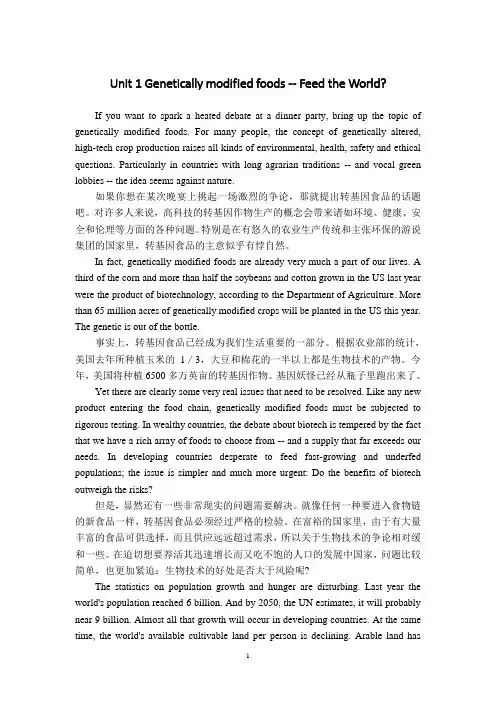
Unit 1 Genetically modified foods -- Feed the World?If you want to spark a heated debate at a dinner party, bring up the topic of genetically modified foods. For many people, the concept of genetically altered, high-tech crop production raises all kinds of environmental, health, safety and ethical questions. Particularly in countries with long agrarian traditions -- and vocal green lobbies -- the idea seems against nature.如果你想在某次晚宴上挑起一场激烈的争论,那就提出转基因食品的话题吧。
对许多人来说,高科技的转基因作物生产的概念会带来诸如环境、健康、安全和伦理等方面的各种问题。
特别是在有悠久的农业生产传统和主张环保的游说集团的国家里,转基因食品的主意似乎有悖自然。
In fact, genetically modified foods are already very much a part of our lives. A third of the corn and more than half the soybeans and cotton grown in the US last year were the product of biotechnology, according to the Department of Agriculture. More than 65 million acres of genetically modified crops will be planted in the US this year. The genetic is out of the bottle.事实上,转基因食品已经成为我们生活重要的一部分。
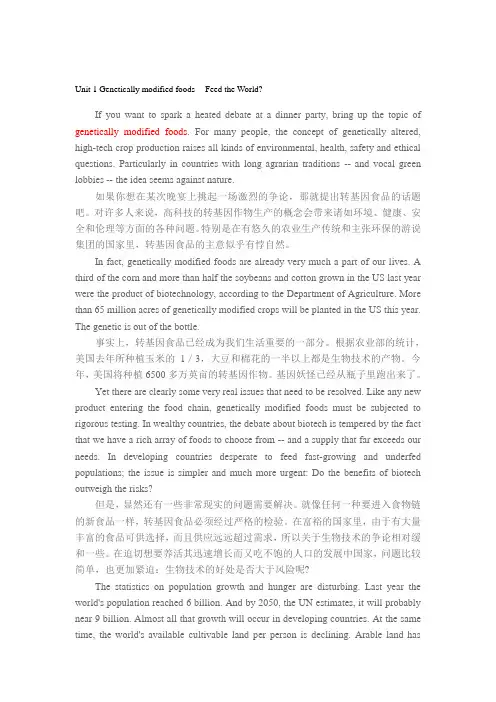
Unit 1 Genetically modified foods -- Feed the World?If you want to spark a heated debate at a dinner party, bring up the topic of genetically modified foods. For many people, the concept of genetically altered, high-tech crop production raises all kinds of environmental, health, safety and ethical questions. Particularly in countries with long agrarian traditions -- and vocal green lobbies -- the idea seems against nature.如果你想在某次晚宴上挑起一场激烈的争论,那就提出转基因食品的话题吧。
对许多人来说,高科技的转基因作物生产的概念会带来诸如环境、健康、安全和伦理等方面的各种问题。
特别是在有悠久的农业生产传统和主张环保的游说集团的国家里,转基因食品的主意似乎有悖自然。
In fact, genetically modified foods are already very much a part of our lives. A third of the corn and more than half the soybeans and cotton grown in the US last year were the product of biotechnology, according to the Department of Agriculture. More than 65 million acres of genetically modified crops will be planted in the US this year. The genetic is out of the bottle.事实上,转基因食品已经成为我们生活重要的一部分。
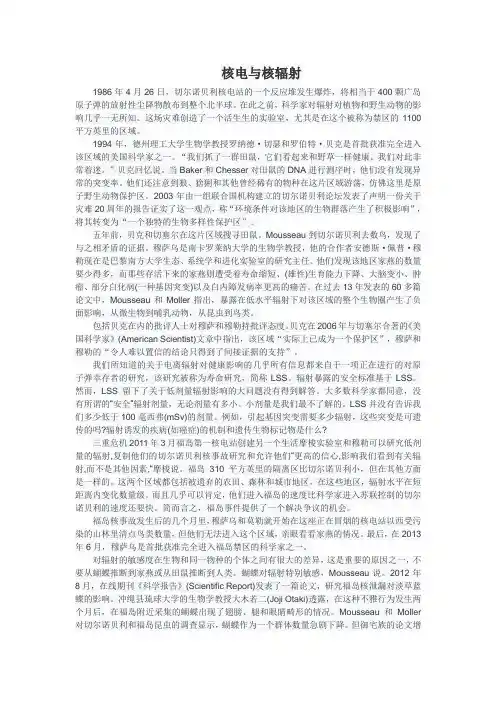
核电与核辐射1986年4月26日,切尔诺贝利核电站的一个反应堆发生爆炸,将相当于400颗广岛原子弹的放射性尘降物散布到整个北半球。
在此之前,科学家对辐射对植物和野生动物的影响几乎一无所知。
这场灾难创造了一个活生生的实验室,尤其是在这个被称为禁区的1100平方英里的区域。
1994年,德州理工大学生物学教授罗纳德·切瑟和罗伯特·贝克是首批获准完全进入该区域的美国科学家之一。
“我们抓了一群田鼠,它们看起来和野草一样健康。
我们对此非常着迷。
”贝克回忆说。
当Baker和Chesser对田鼠的DNA进行测序时,他们没有发现异常的突变率。
他们还注意到狼、猞猁和其他曾经稀有的物种在这片区域游荡,仿佛这里是原子野生动物保护区。
2003年由一组联合国机构建立的切尔诺贝利论坛发表了声明一份关于灾难20周年的报告证实了这一观点,称“环境条件对该地区的生物群落产生了积极影响”,将其转变为“一个独特的生物多样性保护区”。
五年前,贝克和切塞尔在这片区域搜寻田鼠。
Mousseau到切尔诺贝利去数鸟,发现了与之相矛盾的证据。
穆萨乌是南卡罗莱纳大学的生物学教授,他的合作者安德斯·佩普·穆勒现在是巴黎南方大学生态、系统学和进化实验室的研究主任。
他们发现该地区家燕的数量要少得多,而那些存活下来的家燕则遭受着寿命缩短、(雄性)生育能力下降、大脑变小、肿瘤、部分白化病(一种基因突变)以及白内障发病率更高的痛苦。
在过去13年发表的60多篇论文中,Mousseau和Moller指出,暴露在低水平辐射下对该区域的整个生物圈产生了负面影响,从微生物到哺乳动物,从昆虫到鸟类。
包括贝克在内的批评人士对穆萨和穆勒持批评态度。
贝克在2006年与切塞尔合著的《美国科学家》(American Scientist)文章中指出,该区域“实际上已成为一个保护区”,穆萨和穆勒的“令人难以置信的结论只得到了间接证据的支持”。
我们所知道的关于电离辐射对健康影响的几乎所有信息都来自于一项正在进行的对原子弹幸存者的研究,该研究被称为寿命研究,简称LSS。
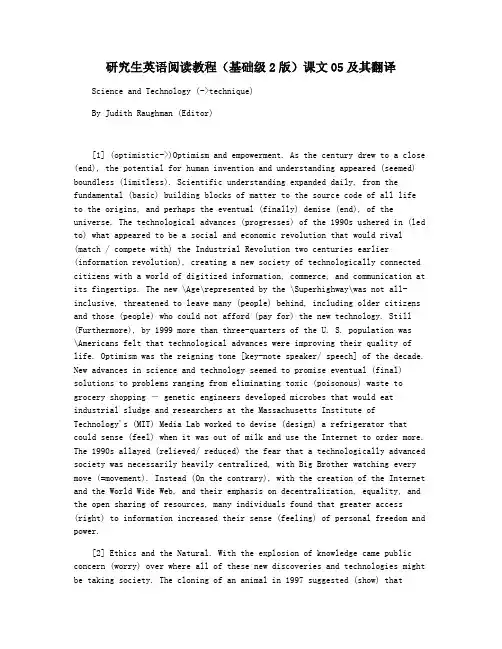
研究生英语阅读教程(基础级2版)课文05及其翻译Science and Technology (->technique)By Judith Raughman (Editor)[1] (optimistic->)Optimism and empowerment. As the century drew to a close (end), the potential for human invention and understanding appeared (seemed) boundless (limitless). Scientific understanding expanded daily, from the fundamental (basic) building blocks of matter to the source code of all life to the origins, and perhaps the eventual (finally) demise (end), of the universe. The technological advances (progresses) of the 1990s ushered in (led to) what appeared to be a social and economic revolution that would rival (match / compete with) the Industrial Revolution two centuries earlier (information revolution), creating a new society of technologically connected citizens with a world of digitized information, commerce, and communication at its fingertips. The new \Age\represented by the \Superhighway\was not all-inclusive, threatened to leave many (people) behind, including older citizens and those (people) who could not afford (pay for) the new technology. Still (Furthermore), by 1999 more than three-quarters of the U. S. population was\Americans felt that technological advances were improving their quality of life. Optimism was the reigning tone [key-note speaker/ speech] of the decade. New advances in science and technology seemed to promise eventual (final) solutions to problems ranging from eliminating toxic (poisonous) waste to grocery shopping ― genetic engineers developed microbes that would eat industrial sludge and researchers at the Massachusetts Institute of Technology's (MIT) Media Lab worked to devise (design) a refrigerator that could sense (feel) when it was out of milk and use the Internet to order more. The 1990s allayed (relieved/ reduced) the fear that a technologically advanced society was necessarily heavily centralized, with Big Brother watching every move (=movement). Instead (On the contrary), with the creation of the Internet and the World Wide Web, and their emphasis on decentralization, equality, and the open sharing of resources, many individuals found that greater access (right) to information increased their sense (feeling) of personal freedom and power.[2] Ethics and the Natural. With the explosion of knowledge came public concern (worry) over where all of these new discoveries and technologies might be taking society. The cloning of an animal in 1997 suggested (show) thathuman cloning had become viable (feasible) as well (too), raising concerns ― no longer quite theoretical ― that humanity might be moving toward a\(adventurous) new world\in 1990 with a mission (missionary/ task) to decode the entire human genetic makeup, held (raise) promises (hope) for an end (terminate) to genetic disorders, but threatened to open the way for\babies\who could be genetically altered to suit their parents' wishes. While many (people) argued that plant and animal breeders had been fooling around with genetics for centuries in order to better (improve) the lot of humankind, others pointed out that new advances (progresses) in genetics allowed researchers to cross boundaries set by nature, implanting human genes in animals in order to turn them into medicine factories, creating plants that produced plastics and glowed in the dark, even attempting (trying) to create “terminator\own reproductive capacity (ability) in order to maintain (keep) the seed manufacturer's cash flow. The question of what was \the environment and the organisms in it seemed safe from genetic tinkering. Yet, while experiments with human cloning or customizing a child's genetic makeup seemed abhorrent (horrible/ terrible) to most Americans, there was general supportfor genetic research that could help to identify(recognize) and cure genetic diseases or make food sources healthier and more plentiful for a growing global population.[3] (private->)Privacy. Privacy was an overarching (most important) concern (worry) with many of the technological and scientific advances of the 1990s. The Internet was an amazing (surprising) new tool for sharing information, yet it was also a powerful means (tools) for finding information that was intended to be private, including government and military secrets, the source codes to proprietary (private) software, and even a neighbor's social security number. Companies and individuals alike (ad. similarly) worried that their private information would be compromised when (since) sophisticated computer technologists could \into protected computer systems and erase or steal important data. Computer viruses, self-replicating codes (program) written by malicious individuals, could steal into personal computer systems through e-mail or the Web and wreak havoc with (make a mess of) the data stored there. Protecting privacy over the Internet was not easy, and many people worried that government attempts (try) to intervene would only cripple (disable/ paralyze) the development of the Internet. Similar fears were sparked (vt. sparkled) when concerned (relevant) groups lobbied (persuade) the government to outlaw pornography and other disturbing materials on the Web in the name of \agreed that children should not be exposed to (touch/ watch) suchmaterial, attempts (efforts) to regulate (control) the content of individual Web pages and newsgroups conflicted with the idea of the Internet as an open, decentralized mass medium, where even the most absurd or repellant (disgusting) ideas could receive a hearing (have some audience). Digital surveillance inthe workplace also became an issue (problem), as (when) some companies spiedon (watch) their workers' use of the Internet and e-mail. [sur-: above; from above][4] Genetics and Privacy. Advances (progresses) in genetics alsothreatened personal privacy. With the Human Genome Project scheduled (planned) to be finished early in the twenty-first century, and private companies competing to win patents on genetic discoveries, many individuals worriedabout what scientists might do with a complete understanding of the human genetic code. While genetic diseases could be discovered and perhaps cured,this information might also be used to discriminate against people predisposed (inclined to) to certain genetic malfunctions, or to group (vt./ classify) individuals based on their genetic data. The idea that scientists would own patents on the human genetic code was disturbing, as well, as (for/ since) it meant that human life could become a proprietary (private) resource (property).[5] Big Science And Little Science. The National Aeronautics and Space Administration (NASA) continued to wow (surprise) the world, sending the giant Hubble Telescope into orbit to gather and transmit never-before-seen images (picture) of deep space that offered (gave) increasingly tantalizing (attractive) clues to the origins of the universe. The search forextraterrestrial life continued during the decade, as NASA scientists found possible evidence of bacterial life in a meteor from Mars, and distant planets were discovered that might contain water. NASA sent space probes (n./vt.) to land on the surface of Mars, sent national hero John Herschel Glenn Jr. back into space to study aging, and made plans to build an International Space Station with research teams from other countries. Still (Furthermore), some critics wondered if all of the money spent on space research might not bebetter used to fund new discoveries here on Earth, almost as if the (divide->)diversion of space was no longer as necessary when (since) there were so many new and interesting projects going on right here. One of the most fascinating (attractive) new realms (world/ field) of study was nanotechnology, a field of research that attempted to manipulate matter at the molecular level, building new devices (equipment) atom by atom that could be used inminiaturized manufacturing, drug-delivery system, and tiny (small) minicomputers. With the discovery of a new family of carbon molecules known asfullerenes, nanotechnology researchers had a new raw material to work with (process). The science was still very experimental at the turn (beginning) of the century, but researchers and government officials saw great potential for this science of the tiny (small). (1, 151 words)deliver milk/ a babyABOUT THE TEXTThis text is excerpted from the book American Decades 1990-1999, edited by Judith Baughman (Editor), Victor Bondi (Editor), Vincent Tompkins (Editor) and Gale Group, which is the last volume of the American Decades 1900-2000 Series. The series is the latest installment of the Gale series documenting thehistory and social trends of the United States of America during the 20th century. The current text is the overview (summary) of the book's one chapter on Science and Technology.EXERCISESI. Reading ComprehensionAnswer the following questions or complete the following statements. 1. This article is mainly about _____.A. how to tackle the problems in the new \B. the direction of scientific and technological developmentC. both the positive and negative effects of the technological advancesD. the great impact on our ethics and privacy brought by the technological advances2. The \ _____. A. represents the digital age B. emphasizes on humanity C. is highly civilized D. benefits everyone except older citizens3. The phrase \ A. interested in B. accustomed to C. fascinated by D. connected to4. Which of the following is NOT responsible for the increased sense of personal freedom and power?A. A technologically advanced society is centralized.B. There is much greater access to information than before.C. People can have the open sharing of resources online.D. The notion of equality is emphasized on the Internet.5. Concerned about the potential effect of the Human Genome Project, most Americans would _____.A. welcome human cloning to improve their standard of livingB. support the genetic research which could help to cure genetic diseasesC. welcome creating plants that produced plastics and glowed in the darkD. support making genetically altered babies to suit their parents' wishes6. How could the \A. They are so reproductive that they will outsell other kinds of seeds.B. The patents on the \C. The farmers have to buy seeds again as the \seeds themselves.D. Because the plants, into which the \the dark, the seeds sell extremely well.7. Many people who think government should not outlaw pornography on the Web believe that _____.A. there were still a large number of people who have need for pornographyB. everyone could voice his ideas, no matter how weird or offensive they areC. the government had no right to interfere with the development of the InternetD. the government might be encouraged to spy on each suspicious computer8. The development of genetic science might threaten personal privacy in that _____. A. the data of the people with genetic diseases will be published B. people may be treated differently based on their genetic dataC. patents on the human genetic code will bring scientists enormousprofits D. scientists will use information about human life for personal gains9. \_____. A. the study of life in outer space B. the study of the origin of life C. the study of molecules D. the study of nanotechnology10. What is the critics' attitude towards the large scale of spaceresearch as mentioned in the last paragraph?A. They believe that such a research would be a waste of resources.B. They doubt its necessity because there are new and interesting projectson Earth. C. They are concerned that space research would prove to befruitless. D. They believe that space research is not so important as nanotechnology.II. VocabularyA. Read the following sentences and decide which of the me choices beloweach sentence is closest in meaning to the underlined word.1. The demise (death) of the industry has caused untold misery tothousands of hard-working (diligent) tradesmen. A. size B. expansion C. development D. termination2. There were difficulties for her about making the whole surgeryfinancially viable (feasible) and eventually (finally) she left. A.practicable B. sufficient C. deficient D. impractical3. Learning some basic information about preparing and delivering (~ a speech) formal presentations can help allay (relieve/ reduce) some of the fear involved in public speaking. [oral presentation]A. ease [(1)n. feel at ~; (2)to relieve pain]B. expressC. preventD. dispose (get rid of)4. Whatever the cause (may be), the incident could easily cripple (damage/ paralyze) the peace talks.A. influenceB. damageC. endD. complicate (a./ vt.)5. Government can and must provide opportunity, not smother it; foster (develop/ cultivate)productivity, not stifle it.A. retainB. repress (suppress)C. crashD. abandon (abundant: a. enough)6. He listened keenly to his guests, treated what he heard with complete discretion and never said a malicious word. [malice: n.->malicious: a.] [bekeen on sth.] A. disheartening (discouragingencourage) B. sympathetic [sym-: same; pathy: feeling C. harsh (severe) D. polite [be sympathetic withsb./ sympathize with sb.]7. After the summit (peak) meeting, peace reigned throughout the region once more (again). A. emerged (appeared) B. continued C. dominated D. resumed (restore)8. There are many people who still find the act of abortion abhorrent (disgusting/ horrible/ terrible).A. shocking (=surprising)B. (tolerate->)tolerableC. uncontrollable [high ~low ~]D. distasteful (disgusting) 9. The police have got the evidence to sue him, which is shot with a miniature (hidden) camera. A. small B. digitalC. concealed (hidden)D. sophisticated [shoot, shot shot/ gun shot]10. The chief [chef=cook] has assembled (collected) 300 tantalizing (attractive) recipes for all occasions and lifestyles, plus down to earth(=practical) advice on matching food with wine. A. disturbing B. tempting C. promising D. offending (=offensive/ ~ talk)B. Choose the best word or expression from the list given for each blank. Use each word or expression only once and make proper changes where necessary.predisposed to decode wreak havoc compromise malfunction at one's fingertips usher in discriminate toxic customize1. You have to admit how wonderful the service center is ― it just puts anything you may possibly need at your fingertips!2. He belonged to a generation that took it for granted that after the wara brave new world was to be ushered in (be led to somewhere).3. We must understand the double language used today and carefully decode its meaning.4. The civil war has wrought havoc on the economy.5. The government's future may be plunged (dive) into jeopardy (danger) unless the coalition () partners manage to (try to) reach a compromise. [win-win situation]6. This heat can cause certain circuit-board components to malfunction or fail altogether.7. Evidence showed the herbs were not toxic (poisonous) and did not contain poisons or common drugs.8. It was alleged (claimed) that the restaurant discriminated against black customers. [Negro] 9. Some people are genetically predisposed (inclined to do sth.) to cancers.10. You are in charge of your own schedule (plan/ timetable) and can customize that schedule to fit your own training needs. [(1)charge sb with sth.=accuse sb. of sth.; (2)~a battery; (3) be in charge of sth.(4)~ sb. some money]III. Cloze感谢您的阅读,祝您生活愉快。
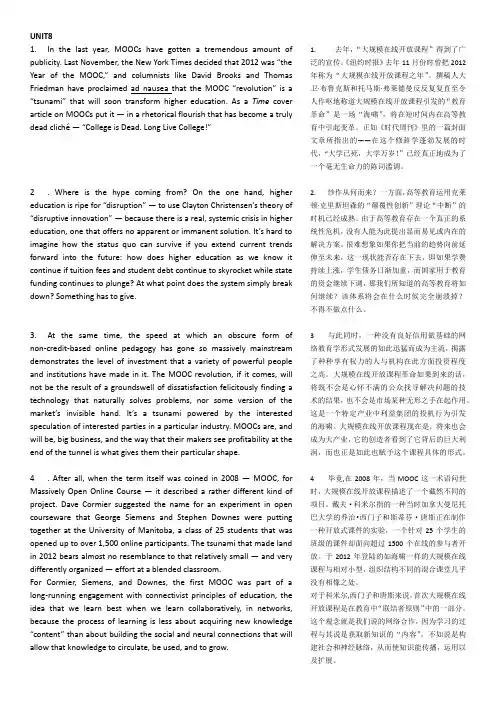
UNIT81. In the last year, MOOCs have gotten a tremendous amount of publicity. Last November, the New York Times decided that 2012 was “the Year of the MOOC,” and columnists like David Brooks and Thomas Friedman have proclaimed ad nausea that the MOOC “revolution” is a “tsunami” that will soon transform higher education. As a Time cover article on MOOCs put it — in a rhetorical flourish that has become a truly dead cliché — “College is Dead. Long Live College!”2. Where is the hype coming from? On the one hand, higher education is ripe for “disruption” — to use Clayton Christensen’s theory of “disruptive innovation” — because there is a real, systemic crisis in higher education, one that offers no apparent or immanent solution. It’s hard to imagine how the status quo can survive if you extend current trends forward into the future: how does higher education as we know it continue if tuition fees and student debt continue to skyrocket while state funding continues to plunge? At what point does the system simply break down? Something has to give.3.At the same time, the speed at which an obscure form of non-credit-based online pedagogy has gone so massively mainstream demonstrates the level of investment that a variety of powerful people and institutions have made in it. The MOOC revolution, if it comes, will not be the result of a groundswell of dissatisfaction felicitously finding a technology that naturally solves problems, nor some version of the market’s invisible hand. It’s a tsunami powered by the interested speculation of interested parties in a particular industry. MOOCs are, and will be, big business, and the way that their makers see profitability at the end of the tunnel is what gives them their particular shape.4. After all, when the term itself was coined in 2008 — MOOC, for Massively Open Online Course — it described a rather different kind of project. Dave Cormier suggested the name for an experiment in open courseware that George Siemens and Stephen Downes were putting together at the University of Manitoba, a class of 25 students that was opened up to over 1,500 online participants. The tsunami that made land in 2012 bears almost no resemblance to that relatively small — and very differently organized — effort at a blended classroom.For Cormier, Siemens, and Downes, the first MOOC was part of a long-running engagement with connectivist principles of education, the idea that we learn best when we learn collaboratively, in networks, because the process of learning is less about acquiring new knowledge “content” than about building the social and neural connections that will 1. 去年,“大规模在线开放课程”得到了广泛的宣传。

第一单元自动化第二部分阅读A自动化的含义“自动化”已经是,而且现在仍然是,一个被大量滥用的词。
但是,人们对其确切的意义以及所包括的内容,正在逐渐地有了较为正确的了解。
如果不是下一个定义的话,我也许可以尝试作些解释,把自动化说成是一个概念。
运用这个概念,人们通过对机器装置的性能进行充分的测量、观察和控制,从而使其以最高的效率运转。
这需要对这种装置的功能有一个详细而连贯性的了解,以便需要时便能运用最佳的矫正操作。
自动化按其确切的意义,只有全面运用通信、计算和控制三个主要组成部分(“三C" )才能完全实现。
我认为,确保人们对合为一体的三个组成部分对我们的社会所蕴含着的某些意义有所认识和了解,是很有必要的。
首先,我们不妨考虑工业部门之一的炼钢工业。
在炼钢工业中,自动化已经开始成型。
到过钢厂的人都会知道从高炉开始的各种工艺流程的一些情况,成品条钢或板钢生产出来之后,再准备送往制造工艺车间或汽车厂,这些工艺流程是相互链接的。
为了使工厂中各个车间充分发挥效率,可以使用计算机来控制每个车间。
在此之前,计算机工作所需要的一切资料均输入机内。
就高炉来说,需要给计算机提供装人高炉的原料的信息、高炉工作温度的信息和处理各种各样配料的最好方法等方面的资料。
钢厂的高炉操作是一项复杂而要求技术熟练的作业,需要大量的知识和大量的综合信息,并迅速地做出判定选择,以便确保高炉工艺流程中的下一阶段的有效工作。
计算机对所有这一切都了解得很透彻,能够做出非常大量的中间判定,并且能够把全部信息立刻和不间断地提供给管理人员,以使他们做出高效管理这个工厂所需要的最后决定。
由此产生的信息数据和判定要进行处理,然后转送到下一个工序。
在这里,对操作的一些专门细节再次进行整理,提出最佳和最终的判定,然后对这些信息再一次进行处理并输送给下一道工序。
同时,当信息数据从生产单元的一道工序输送到下一工序并完全结合成为一项新的操作时,每次变化的结果反馈到最初阶段,而且,不断地做进一步的调整,结果是整个工厂的工艺流程便能够高效率地进行下去。
Unit 1Text A 如何变“末流”为“一流”:哈佛对捐赠大户的回报1 初春的一个夜晚,暖意融融。
一群公司执行官、律师、石油巨子、理财经纪人、身价不菲的咨询师以及巨额财产继承人,悄然走出查尔斯宾馆和哈佛饭店的套房。
这些商界显要,男的个个头发花白,身着灰色西装──有的拄着手杖,有的则由于长期在哈佛运动队或网球队锻炼,一副运动员身材,充满活力、脸色红润;女的戴着丝巾,身穿苗条的黑色长裤,但其中几乎没有一张黑人和拉美人的面孔,他们穿过一道普通的门,走进安尼博格餐厅。
此次聚会,校内没有通报,媒体也不得报道。
2平常简朴的新生餐厅今天用连翘花和郁金香装点一新,客人们品尝着鸡尾酒、葡萄酒和牛柳、蟹黄蛋糕、芦笋尖等开胃小菜,享受着时任哈佛校长劳伦斯·撒莫斯的殷勤。
有几位客人谈论着海斯特布丁俱乐部最近的那场演出,这个俱乐部是一个学生戏剧协会,每年春天都要上演一场音乐滑稽戏,由哈佛的男生男扮女装参加表演。
3过了一会儿,布置在二楼阳台的哈佛乐队开始演奏“万名哈佛人”,客人们各自入席,烛光晚宴开始。
酒足饭饱之后,客人们兴高采烈,对撒莫斯校长的餐后致词报以阵阵掌声。
唯一例外的是,撒莫斯校长简要介绍学校计划扩大低收入家庭子女的招生,为年收入低于四万美元家庭的子女上哈佛提供免费教育,此时,校长似乎在等待在场贵宾们赞许的掌声,但竟然没有掌声。
我分析,这种令人尴尬的沉默传递了一个信号,甚至可称为威胁:你要是扩大招收低收入家庭的子女而将我们这些人的孩子拒之门外,我们就会停止数以百万计的捐款。
44月8日的这顿晚宴,拉开了哈佛大学学校资源委员会(COUR)2005年年会的序幕。
该委员会或许是高等学校里一个最具财力的顾问团,但鲜为人知,媒体亦少有提及。
实际上COUR不是一般意义上的委员会──它并不正式制定学校政策或发表正式意见──但撒莫斯同其他任何一任哈佛校长一样,离不开COUR的支持。
该委员会成员均为哈佛最大的捐赠人,他们捐赠的资金构成哈佛2005财政年度255亿捐款的主要部分,使得哈佛成为美国高校中收到捐款最多的学校,比位居第二的耶鲁大学高出100亿美元。
核电与核辐射1986年4月26日,切尔诺贝利核电站的一个反应堆发生爆炸,将相当于400颗广岛原子弹的放射性尘降物散布到整个北半球。
在此之前,科学家对辐射对植物和野生动物的影响几乎一无所知。
这场灾难创造了一个活生生的实验室,尤其是在这个被称为禁区的1100平方英里的区域。
1994年,德州理工大学生物学教授罗纳德·切瑟和罗伯特·贝克是首批获准完全进入该区域的美国科学家之一。
“我们抓了一群田鼠,它们看起来和野草一样健康。
我们对此非常着迷。
”贝克回忆说。
当Baker和Chesser对田鼠的DNA进行测序时,他们没有发现异常的突变率。
他们还注意到狼、猞猁和其他曾经稀有的物种在这片区域游荡,仿佛这里是原子野生动物保护区。
2003年由一组联合国机构建立的切尔诺贝利论坛发表了声明一份关于灾难20周年的报告证实了这一观点,称“环境条件对该地区的生物群落产生了积极影响”,将其转变为“一个独特的生物多样性保护区”。
五年前,贝克和切塞尔在这片区域搜寻田鼠。
Mousseau到切尔诺贝利去数鸟,发现了与之相矛盾的证据。
穆萨乌是南卡罗莱纳大学的生物学教授,他的合作者安德斯·佩普·穆勒现在是巴黎南方大学生态、系统学和进化实验室的研究主任。
他们发现该地区家燕的数量要少得多,而那些存活下来的家燕则遭受着寿命缩短、(雄性)生育能力下降、大脑变小、肿瘤、部分白化病(一种基因突变)以及白内障发病率更高的痛苦。
在过去13年发表的60多篇论文中,Mousseau和Moller指出,暴露在低水平辐射下对该区域的整个生物圈产生了负面影响,从微生物到哺乳动物,从昆虫到鸟类。
包括贝克在内的批评人士对穆萨和穆勒持批评态度。
贝克在2006年与切塞尔合著的《美国科学家》(American Scientist)文章中指出,该区域“实际上已成为一个保护区”,穆萨和穆勒的“令人难以置信的结论只得到了间接证据的支持”。
我们所知道的关于电离辐射对健康影响的几乎所有信息都来自于一项正在进行的对原子弹幸存者的研究,该研究被称为寿命研究,简称LSS。
1 Playing video games before bedtime may give people an unusual level of awareness and control in their dreams, LiveScience has learned.LiveScience网站获悉,在睡觉之前玩视频游戏可以让人们有一种不寻常的清醒做梦和控制梦的水平。
2 That ability to shape the alternate reality of dream worlds might not match mind-bending Hollywood films such as "The Matrix," but it could provide an edge when fighting nightmares or even mental trauma.尽管这种塑造现实品梦境的能力与让令人费神才能理解的好莱坞电影《黑客帝国》不同,但它还是能为与噩梦和心理创伤斗争的提供一点优势。
3 Dreams and video games both represent alternate realities, according to Jayne Gackenbach, a psychologist at Grant MacEwan University in Canada. But she pointed out that dreams arise biologically from the human mind, while video games are technologically driven by computers and gaming consoles.据加拿大Grant MacEwan大学的心理学家Jayne Gackenbach说,梦和视频游戏都代表另一种现实。
科技英语阅读1-8单元译文:Unit 1罗素悖论的提出是基于这样的一个事例:设想有这样一群理发师,他们只给不给自己理发的人理发。
假设其中一个理发师符合上述的条件,不给自己理发;然而按照要求,他必须要给自己理发。
但是在这个集合中没有人会给自己理发。
(如果这样的话,这个理发师必定是给别人理发还要给自己理发)1901年,伯特兰·罗素悖论的发现打击了他其中的一个数学家同事。
在19世纪后期,弗雷格尝试发展一个基本原理以便数学上能使用符号逻辑。
他确立了形式表达式(如:x =2)和数学特性(如偶数)之间的联系。
按照弗雷格理论的发展,我们能自由的用一个特性去定义更多更深远的特性。
1903年,发表在《数学原理》上的罗素悖论从根本上揭示了弗雷格这种集合系统的局限性。
就现在而言,这种类型的集合系统能很好的用俗称集的结构式来描述。
例如,我们可以用x代表整数,通过n 来表示并且n大于3小于7,来表示4,5,6这样一个集合。
这种集合的书写形势就是:x={n:n是整数,3<n<7}。
集合中的对象并不一定是数字。
我们也可让y={x:x是美国的一个男性居民}。
表面上看,似乎任何一个关于x的描述都有一个符合要求的空间。
但是,罗素(和策梅洛一起)发现x={a:a不再a中}导致一个矛盾,就像对一群理发师的描述一样。
x它本身是在x的集合中吗?否定的答案导致了矛盾的出现。
当罗素发现了悖论,弗雷格立即就发现悖论对他的理论有致命的打击。
尽管这样,他还不能解决这个问题,并且上世纪有很多的尝试,去解决这个问题(但没有成功)。
罗素自己对这个悖论的回答促进了类型理论的形成。
他解释说,悖论的问题在于我们混淆了数集和数集的集合。
所以,罗素介绍了对象的分级系统:数、数集、数集的集合等等。
这个系统为形式化数学的形成奠定了基础,至今它还应用于哲学研究和计算机科学分支。
策梅洛对于罗素悖论的解决方法用新的公理:对于任意公式A(x)和任意集合b,都会有一个集合满足y={x:x既在b中又满足A(x)}取代了以前的公理:对于任意公式A(x),都会有一个集合满足y={x:x满足A(x)}。
第一单元什么是罗素悖论?约翰·T·鲍德温,奥利弗·莱斯曼撰胡志国译罗素悖论是建立在这样的实例基础之上的:想象有一群理发师,他们(给所有,而且)只给不给自己刮胡子的人刮胡子。
假设这个集体中有一个理发师,他不给自己刮胡子,那么,按照这个集体的定义,他就必须给自己刮胡子。
但这个集体中的任何理发师都不能给自己刮胡子。
(否则,他就是在给自己刮胡子的人刮胡子了。
)伯特兰·罗素1901年发现的这个悖论是对他的一位数学同行的打击。
十九世纪晚期,戈特洛布·弗雷格试图通过符号逻辑为所有的数学建立一个基础。
他在形式表达式(如x=2)和数学特征(如偶数)之间建立了一种对应关系。
在他的推导中,人们可以随意使用任何特征为后来的特征定义。
罗素在他1903年出版的《数学原理》中公布了自己的悖论,证明了弗雷格系统存在根本缺陷。
在今天看来,这类系统最好通过所谓的集的结构式用集合的概念来描述。
例如,对于由数字4、5、6组成的集体,我们可以描述为:x是一个整数的集体,若用字母n表示这些整数,则n大于3小于7。
对这一集合的描述,在形式上我们写作x={n: n为整数,3<n<7}。
集合的对象不一定是数字。
我们可以设y={x:x为美国男性居民}。
很明显,对x的任何描述都可以填入冒号后的区域。
但罗素(恩斯特·策梅洛也独立地)发现,x={a: a不属于a}会导致矛盾的结论,就像对理发师集体的描述一样。
x自身是否属于x?无论是与否,结论都是矛盾的。
罗素发现这一悖论之后,弗雷格马上认识到他的系统被全盘推翻了。
即便如此,他无法解决这个悖论,而为了绕开这个悖论,人们在二十世纪做了许多尝试。
罗素本人对这一悖论的回答是他的“类型论”。
他分析道,之所以会产生悖论,是因为我们混淆了对数的集合的描述与对数的集合的集合的描述。
于是罗素引入了对象的分级系统:数,数的集合,数的集合的集合,等等。
这个系统曾被作为手段用于对数学基础的第一次形式化,并且在今天的某些哲学研究和计算机分支学科中仍有运用。
第十课 A我和松鼠妈妈谈条件玛尔格特戴弗林(1)我和我的丈夫最近从郊区搬到了城里。
(2)两周前我正在书房读书的时候,听到了一阵骚乱声。
为了保护我们新婚的家不受入侵者的骚扰,我拿起了致命的防卫武器——一把扫帚,小心地下了楼。
(3)我走到外面想看看入侵者是从什么地方来的。
正当我四处寻找的时候,看见了这个坏家伙从门廊的屋顶上出现了。
根据它弄出的声音我原以为是一只 50 磅重的浣熊,但是我错了,它只是一只半磅重的灰色的毛茸茸的松鼠。
我拿起扫把嘘声将它赶走,但是第二天我听见它又来了。
(4)我上网搜索了有关松鼠的信息,我发现因为松鼠是啮齿类动物,它们的牙齿会不断地长长,因此它们就必须经常啃食东西来把牙齿磨短。
我了解到它们经常会啃电线,这样房子就有失火的危险。
这倒是挺烦人的。
因此我让我们家的副总裁——也就是我的丈夫——打电话给野生动物管理人员。
星期六的时候,他给第一家公司打电话,他们安排下星期四来处理。
然后他又给另一家公司打电话,他们说可以在星期一上午派人来看看。
(5)星期一上午来了两个抽烟的人。
他们抽完了烟,就大摇大摆地走进了前门廊。
“喂,小夫人!”他们其中的一位摆着一付约翰威恩式样子问到:“捣蛋鬼在什么地方?”(6)我很不自然地指了指门廊的顶部,现在那儿放了一小块写着“欢迎来访”的脚垫。
我看见了洞里的育儿室,而这两个家伙把小松鼠掏出来扔到了雪地上。
我再一次强调让他们不要伤害她。
(7)他们怒气冲冲地说:“我们是慈善学会推荐的”,但是我注意到了他们把电棍放回了卡车,取而代之,拿出了一种有春天香味的除臭剂,在松鼠的窝里喷了几下。
他们告诉我松鼠不喜欢这种味道,因此会逃走。
对此我有点怀疑,因为这种味道挺好闻的。
(8)没有看到松鼠妈妈,所以他们就把洞给堵上了,然后跟我要了一张 250美元的支票,一溜烟地跑了。
他们还给了我一张保修卡。
我是比较容易受骗的那种人,因此我想跟我打交道的这家公司还算是挺有诚信的。
(9)他们走了不一会儿松鼠妈妈大老远的购物回来了。
Why We're Fat1 So why is obesity happening? The obvious, clichéd-but-true answer is that we eat too much high-calorie food and don't burn it off with enough exercise. If only we had more willpower, the problem would go away. But it isn't that easy.为什么会有肥胖症?一个明显、老生常谈但又真实的答案就是我们吃太多高热量食物并且没有进行足够的运动消耗它。
要是我们的意志力更强大,这个问题便迎刃而解了。
但是,问题并不是那么简单。
2 When warned about the dangers of overeating, we get briefly spooked and try to do better. Then we're offered a plateful of pancakes smothered in maple syrup, our appetite overpowers our reason, and before we know it, we're at it again. Just why is appetite such a powerful driver of behavior, and, more important, how can we tame it? 当我们被警告说吃得太多的时候,一时总会被吓倒并努力做好一些。
然后一碟涂满槭糖浆的煎饼摆在面前,我们的食欲战胜了我们的理智,等到我们意识到它的时候,我们又重蹈覆辙了。
到底为什么食欲具有如此强大的推动力?更重要的是,我们怎么才能够控制它?3 Within the past few years, science has linked our ravenous appetites to genes and hormones. Among the hormones that fuel these urges are ghrelin and leptin, known as the "hunger hormones." Ghrelin is produced mostly by cells in the stomach lining. Its job is to make you feel hungry by affecting the hypothalamus, which governs metabolism. Ghrelin levels rise in dieters who lose weight and then try to keep it off. It's almost as if their bodies are trying to regain the lost fat. This is one reason why it's hard to lose weight and maintain the loss.近几年来,科学将我们迫不及待要吃的食欲跟基因和激素联系起来。
激起这些强烈的欲望的激素有胃促生长素和消瘦素,也被称作“饥饿激素”。
胃促生长素主要由胃保护层的细胞产生。
它的职责是影响控制新陈代谢的下丘脑,让你感到饥饿。
当节食者减肥并且努力维持减肥效果,他的胃促生长素水平就会升高。
就像他们的身体要试图恢复失去的脂肪。
这是为什么很难减肥并维持减肥效果的原因之一。
4 Leptin turns your appetite off and is made by fat cells. Low leptin levels increase your appetite and signal your body to store more fat. High leptin levels relay the opposite signal. Many obese people have developed a resistance to the appetite-suppressing effects of leptin and never feel satisfied, no matter how much they eat. Basically, your body uses these hormones to help you stay at your weight and keep you from losing fat —which is another reason why dieting can be so difficult.消瘦素消除你的食欲,它来自脂肪细胞。
低消瘦素水平增加你的食欲并通知你的身体储存更多的脂肪。
高消瘦素水平传递相反的信号。
很多肥胖的人已经形成了一种对消瘦素抑制食欲效应的抵抗,不管他们吃多少也从不感到满足。
从根本上说,你的身体利用这些激素帮助你保持现在的体重,不让你的脂肪流走——这是节食如此之难的另外一个原因。
5 Lack of sleep promotes obesity by messing with these hunger hormones. If you skimp on sleep, ghrelin levels rise, making you hungry, and leptin levels dip, which signals a need for calories. During my internship, I was chronically sleep-deprived because I had to be at the hospital and stay up all night every third night. I gained a lot of weight that year; now I know why. Years later, after I gave birth to my son Alex, I put on a lot of pounds, too —twenty pounds left over from the pregnancy, and twenty pounds from being up all night with him. He had colic (fussiness) and never slept more than twenty minutes at a time the first six months of his life. My weight started coming off more easily when I got more sleep.睡眠缺失促进肥胖,因其干扰了这些饥饿激素。
如果你克扣了睡眠时间,胃促生长素水平升高,使你饥饿,并且消瘦素下降,标志着需求热量。
在实习期间我长期缺觉,因为每隔三个晚上我得通宵熬夜待在医院里。
那年我的体重增加了不少,现在我明白为什么了。
在那几年之后,我生了儿子亚力克斯后又增了好多磅——怀孕期间残留的二十磅,还有夜夜无眠陪着他的二十磅。
他有急性腹痛且在他生命中的头六个月从未试过连续睡二十分钟以上。
当我有了更多睡眠时间,我的体重开始更容易降下来。
6 Besides ghrelin and leptin, many other hormones play a role in appetite. Scientists have been looking for ways to control all these hunger hormones, but so far nothing usable has panned out.除了胃促生长素和消瘦素,很多其他的激素对食欲也有影响。
科学家一直在寻找控制这些饥饿激素的方法,但是目前还没有成果。
7 Hunger isn't the only reason people eat and eat and eat. Stress, depression, boredom, loneliness, and even joy all come into play. And some of us may just be inclined to gain weight while others are not, due to genetics. Scientists are unclear as to how much of a role genetics plays in how chubby you are, but estimates range from as low as 20 percent to as high as 90 percent. In studies of twins, researchers have found that siblings wind up with similar body weights, whether or not they are raised in different families, and that adopted children are much more likely to grow to the size of their natural parents than their adoptive ones. Scientists speculate that part of the reason so many of us are susceptible to layering on fat is due to the "thrifty gene." Supposedly, it's a gene passed down from our prehistoric ancestors who could eat a lot and build up reserves of fat to survive frequent famines. Genetically, this made sense when you didn't know if your next meal would be tomorrow or a week from now, but when your next meal is whenever you drive by a fast-food restaurant, that's a problem.饥饿不是人们不停地吃的唯一原因。